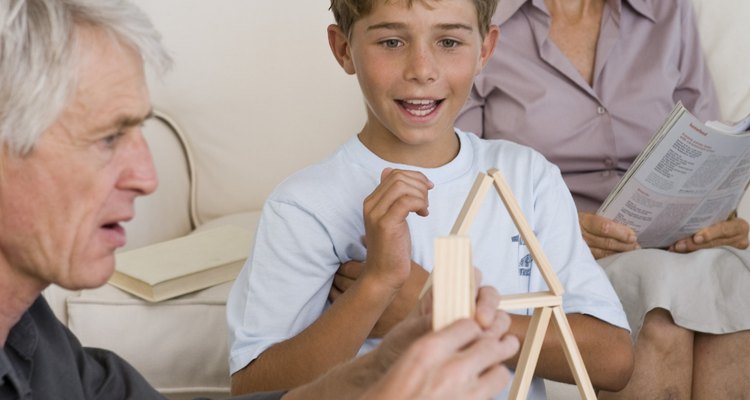
Jupiterimages/Pixland/Getty Images
Being a grandparent is usually a rewarding role that can bring your family closer. If, however, you are faced with a husband who appears to be jealous over the time or attention you afford your grandchildren, it can lead to feelings of resentment. Although jealousy is often associated with insecurity, Clinical Psychologist Robert L. Leahy explains in the online publication “Jealousy Is a Killer: How To Break Free From Your Jealous Feelings,” that jealousy can be a way of coping. This coping can be in response to feelings of abandonment and isolation or can be a simple reaction to change.
Initiate a conversation with your husband, pointing out to him the evidence of his jealousy. Avoid blaming or judging your husband’s behaviors or statements and instead listen, clarify and reflect on what he says. A good way to start the conversation is to ask, “Is everything OK with you? I notice that you seem to spend time in your office when I come home after being with the grandchildren.” This can initiate conversation without creating an atmosphere of confrontation. Use “I” statements in asking about your husband’s apparent jealous behavior and stick to facts when describing what he does to suggest that he feels jealous.
Work toward helping your husband feel less jealous and if applicable, more secure, by reinforcing mutual problem solving and positive behaviors. Instead of focusing your attention on your husband’s apparent jealousy, an effective alternative approach is to point out and create positive experiences. These can include you and your grandchildren, but it’s also important to reinforce experiences shared solely by you and your husband or behaviors exhibited by your husband. Express appreciation to your husband and provide genuine compliments for his help around the home. When you are faced with a problem, elicit your husband’s help in formulating solutions. In some cases, explains Dr. Leahy, jealousy can arise when a vital role is removed, such as being the “go to” person when you have a problem. Expressing appreciation and involving your husband in a solution boosts feelings of self-efficacy and can reduce jealousy.
Encourage your husband to spend time with you and your grandchildren. Whether you are a blended family or biologically related, grandparent figures are vital for the emotional and intellectual growth of children. Rather than spending your time alone with your grandchildren, suggest activities that your husband might also enjoy and invite him to be a part of time spent together with family. Work with your husband to identify new activities for future family outings and encourage him to take the reins of planning the time surrounding the activity. Much like problem solving, eliciting the help of your husband in planning family activities can increase his feelings of inclusion and reduce jealousy that can occur if he feels slighted.
Increase the amount of time you spend with your husband. Your husband’s jealousy may arise from changes caused by the demands of being a grandparent. Instead of the life you previously had together, you now have other responsibilities that reduce the amount of time on which your husband previously relied. Change can be good, but it can also make someone feel less secure and the future seem less predictable. Make an effort to focus on quality of time spent together, rather than quantity. If possible, create surprise activities such as drives out to the country or intimate dinners together. Avoid using your time together to discuss your husband’s apparent feelings of jealousy, unless he indicates that he wants to broach the subject.
Related Articles

How to Deal With Feelings of Rejection ...

How to Be More Comfortable With ...

How to Deal With a Jealous Adult Child

How to Get Over a Broken Heart from ...

How to Cope With a Clingy Husband

Types of Conflict in Marriage

How to Deal With a Teenage Boy That Is ...

How to Cope With a Disrespectful ...

How to Deal With a Husband's Drug ...

How to Repair a Strained Marriage

What Is Healthy Jealousy?

Divorcing a Needy Husband

How Does Lack of Trust Affect a ...

How to Get Over Your Wife Cheating on ...

How to Stop Being Overbearing to a ...

How to Get Someone to Admit to Cheating

How to Deal With Frustrations in ...

How to Fix a Relationship After Cheating

Teenagers and the Importance of Friends

How Do We Cope if My Wife Thinks I ...
References
Writer Bio
Maura Banar has been a professional writer since 2001 and is a psychotherapist. Her work has appeared in "Imagination, Cognition and Personality" and "Dreaming: The Journal of the International Association for the Study of Dreams." Banar received her Bachelor of Arts in psychology from Buffalo State College and her Master of Arts in mental health counseling from Medaille College.
Photo Credits
Jupiterimages/Pixland/Getty Images